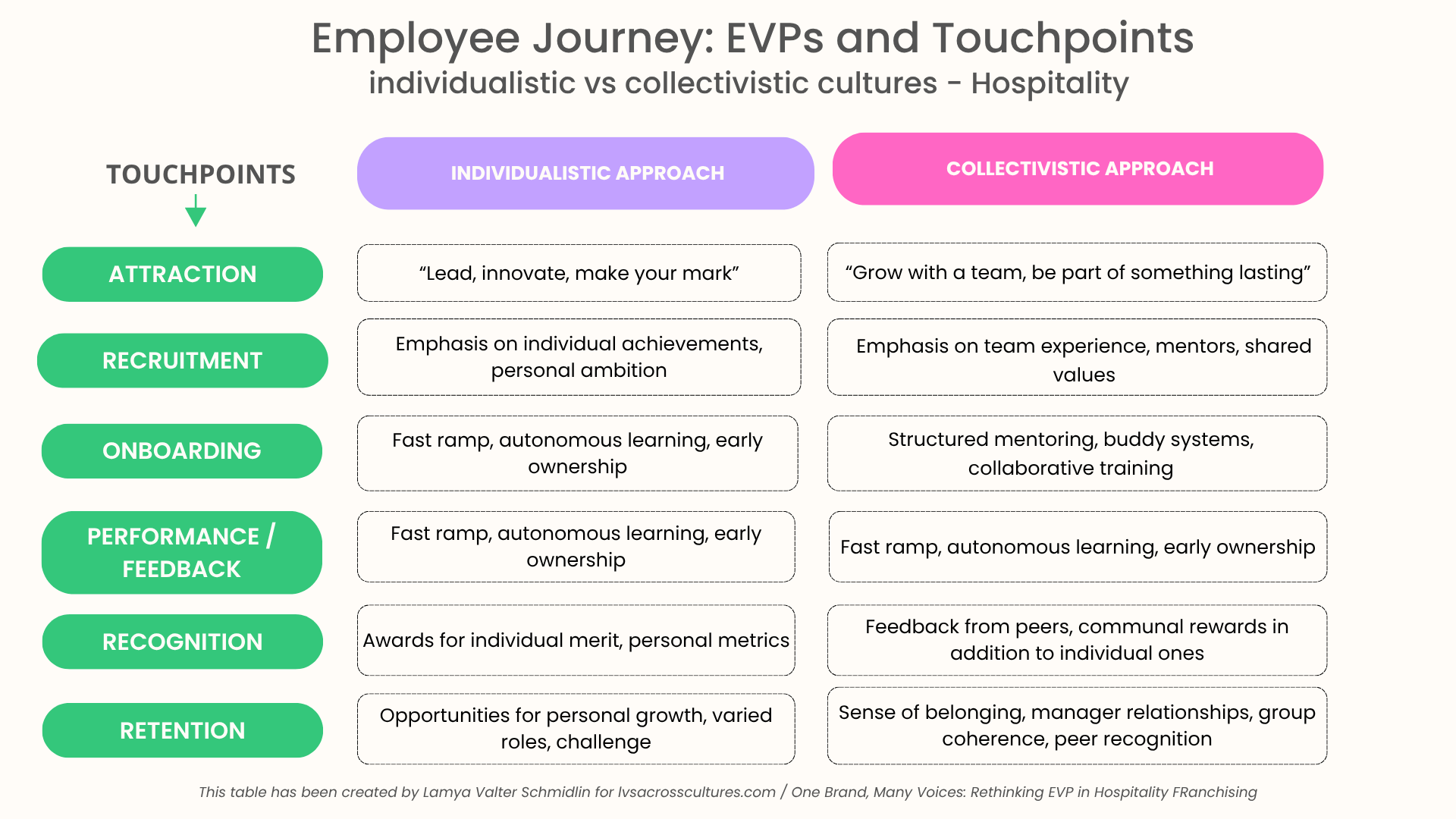One Brand, Many Voices: Rethinking Global EVP in Hospitality Franchising
Fueled by the demand for experience-led and lifestyle concepts, hospitality brands with strong identity are expanding internationally, often through franchise models, where talent plays a central role as frontline brand ambassadors. In this context, employer branding (EB) goes beyond a communication tool and becomes a strategic asset. This brings forward a key tension in international expansion: Should EB be homogenized for consistency or localized for cultural fit? For brands rooted in strong home-country values, this becomes even more complex. What resonates with talents in Amsterdam or Miami may not carry the same emotional weight in Buenos Aires or Paris. More than only operational, the challenge is also cultural and aspirational.
CROSS-CULTURAL MANAGEMENTHOSPITALITYHUMAN RESSOURCESINTERCULTURAL
Lamya Valter Schmidlin
10/7/20254 min read
When a hospitality brand expands into new international markets via franchising, it exports its business model and also introduces its EVP (Employer Value Proposition) -> the unique set of offerings, values, and experiences it provides to employees. According to Backhaus and Tikoo (2004), the EVP is deeply rooted in the organization's corporate identity and culture, serving as a strategic tool to attract and retain talents.
More than new legal and regulatory environments, when brands cross borders, they encounter diverse cultural frameworks that shape how the EVP is understood and valued. Employees in different countries interpret the EVP through their own cultural lens. What may be seen as a compelling benefit in one culture might carry less weight or even negative connotations in another. “EB is value-laden; its implementation and effectiveness likely depend on the match between the context in which it is adopted and the way it is executed.” (Aggerholm et al., 2011). It reflects not only company values, but also cultural assumptions about what work means, what motivates people, and how people identify with organizations.
This insight builds on Hofstede’s assertion that culture shapes the values consumers (and employees) hold, the goals they pursue, and the cognitive frameworks through which they make sense of their environment. In practice, this means that a universal EVP message will be interpreted differently across markets. Its impact will depend on how well it aligns with cultural priorities. Develop to fit the target’s expected values, in individualistic cultures like the U.S. or the Netherlands, an EVP may highlight:
Career progression
Personal recognition
Innovation and ownership
Flexibility and autonomy
However, in collectivistic cultures such as Argentina, Italy, or Spain, employee expectations often revolve around:
Belonging and shared purpose
Social harmony and team cohesion
Clear structures and interdependence
Stability and inclusion within a group
When a globally defined EVP fails to recognize these differences, a disconnection can emerge between what the brand promises and what local talent actually values.
The franchise model: tension between global control and local culture
Franchising adds another layer of complexity. While brand standards remain centralized, operational control is typically local. This often leads to a gap between the global EVP and the daily lived experience of employees on the ground. Studies show that employer branding must account for national culture, industry-specific dynamics, and organizational structure (Knox & Freeman, 2006). In the hospitality sector, which is often perceived as low-skill, low-wage, and associated with antisocial hours (Sciukauske, 2020), a strong, credible EVP is essential to attract and retain talent. When global HQ mandates a rigid EVP with minimal local adaptation, the result can be disengagement among staff, inconsistency in guest experience, high turnover or difficulty building a strong internal culture.
Taking time to look after a strategy that can resonate both globally and locally is essential.
EVP across cultures: co-creation
For instance, when a French luxury hotel brand known for “l’art de recevoir à la française”, expands to a culturally distinct market like Miami, it must decide how to adapt its sEmployer Value Proposition (EVP). In France, its EVP may emphasize tradition, prestige, appealing to staff who value structure, status, and excellence in craft. When opening a franchised property in Miami, this same EVP may not resonate in the same way. The local labor market—diverse, informal, and influenced by Latin American and Caribbean cultural norms may value more casual interactions, visible enthusiasm, flexible roles, and quicker advancement opportunities.
Homogenization replicates the original EVP -> emphasizing formality, hierarchy, and prestige, it helps saving on training and preserving brand identity. However, in Miami’s more informal, multicultural labor market, this risks low engagement, high turnover, and misaligned service delivery, as local staff may not identify with rigid protocols.
Localization adapts the EVP to reflect local values -> helps reframing excellence as warm, personalized service, emphasizing team recognition, and offering faster career mobility. While this deepens employee connection and improves guest experience, it will demand more time, resources, and oversight. Without clear boundaries, it can also fragment the brand and create inconsistencies across markets.
Glocalization, particularly in a franchise model, offers a strategic middle path. It preserves non-negotiable core values, such as refined service and attention to detail, while empowering local franchisees to interpret and apply those values in culturally relevant ways. For a franchised hotel in Miami, this might mean training talents to deliver elegance with warmth, celebrating multicultural service styles, and tailoring recognition programs to local expectations. Glocalization helps maintain brand consistency across properties while allowing flexibility in execution, which is crucial in franchising, where operational control is local but brand experience must remain globally coherent.
According to Lievens & Slaughter, effective EB emerges from ongoing relationship management, where internal and external stakeholder boundaries blur. EVP, in this view, is not static but continuously co-created.
This glocal approach involves:
Defining non-negotiable core values (e.g., excellence, inclusion, respect)
Allowing local leaders to interpret these values through culturally relevant practices
Building feedback mechanisms between brand HQ and local HR teams
Empowering employees to live the brand in contextually authentic way
--
When hospitality brands expand globally via franchising, their Employer Value Proposition (EVP) must go beyond simply crossing borders -> it requires a deep understanding of local value priorities, like individualism versus collectivism, and what these mean for employees on the ground. How can brands balance the need for consistent core values with meaningful local adaptation? While a standardized EVP risks disengagement and full localization can fragment the brand, glocalization offers a promising middle ground. The ongoing challenge lies in co-creating an EVP that authentically connects with diverse employees while preserving a unified brand experience. It's an evolving journey for any global franchise.
The articles/books I've read to write this article:
Hein, A. Z., Elving, W. J. L., Koster, S., & Edzes, A. (2025). One size fits all? Employer branding in different contexts, Corporate Reputation Review
Hofstede, G., Hofstede, G. J., & Minkov, M. (2010). Cultures and Organizations: Software of the Mind (3rd ed.). McGraw-Hill.
de Mooij, M. (2019). Global Marketing and Advertising: Understanding Cultural Paradoxes (5th ed.). SAGE Publications.
Knox, Simon & Freeman, Cheryl. (2006). Measuring and Managing Employer Brand Image in the Service Industry. Journal of Marketing Management. 22. 695-716
Sciukauske, Indre. (2020). Employer Brand and Hospitality Services: Theoretical Overview.
Thank you for reading,
Lamya


LVS *AC
Cross-cultural guest experience research
contact
lamya@lvsacrosscultures.com
© 2026. LVS AC - All rights reserved.
